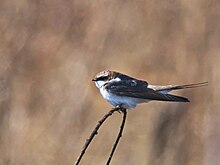Grey-rumped swallow
| Grey-rumped swallow | |
|---|---|

| |
| Grey-rumped Swallow | |
| Scientific classification | |
| Domain: | Eukaryota |
| Kingdom: | Animalia |
| Phylum: | Chordata |
| Class: | Aves |
| Order: | Passeriformes |
| Family: | Hirundinidae |
| Genus: | Pseudhirundo Roberts, 1922 |
| Species: | P. griseopyga
|
| Binomial name | |
| Pseudhirundo griseopyga (Sundevall, 1850)
| |
| Synonyms[1] | |
|
Hirundo griseopyga griseopyga Sibley and Monroe (1990, 1993) | |
The grey-rumped swallow (Pseudhirundo griseopyga) is a species of swallow. It is the only member of the genus Pseudhirundo.
It is found in Angola, Benin, Botswana, Burkina Faso, Burundi, Cameroon, Central African Republic, Republic of the Congo, Democratic Republic of the Congo, Ivory Coast, Equatorial Guinea, Eswatini, Ethiopia, Gabon, Gambia, Ghana, Guinea, Guinea-Bissau, Kenya, Liberia, Malawi, Mali, Mozambique, Namibia, Niger, Nigeria, Rwanda, Senegal, Sierra Leone, South Africa, Sudan, Tanzania, Uganda, Zambia, and Zimbabwe.
Phylogenetic analysis has shown that the grey-rumped swallow is most closely related to the white-backed swallow (Cheramoeca leucosterna) that is found in Australia.[2]
References
[edit]- ^ a b BirdLife International (2017) [amended version of 2016 assessment]. "Pseudhirundo griseopyga". IUCN Red List of Threatened Species. 2017: e.T22712209A118747190. doi:10.2305/IUCN.UK.2017-3.RLTS.T22712209A118747190.en. Retrieved 25 May 2023.
- ^ Schield, D.R.; Brown, C.E.; Shakya, S.B.; Calabrese, G.M.; Safran, R.J.; Sheldon, F.H. (2024). "Phylogeny and historical biogeography of the swallow family (Hirundinidae) inferred from comparisons of thousands of UCE loci". Molecular Phylogenetics and Evolution: 108111. doi:10.1016/j.ympev.2024.108111.
External links
[edit]- Grey-rumped swallow - Species text in The Atlas of Southern African Birds.



